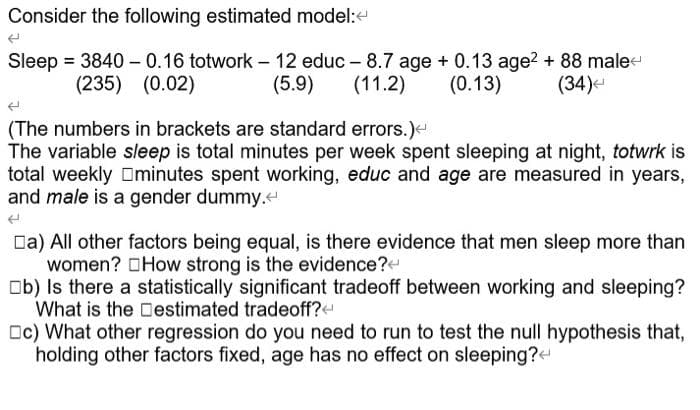Consider the following estimated model: Sleep = 3840 – 0.16 totwork - 12 educ - 8.7 age + 0.13 age? + 88 male (11.2) (235) (0.02) (5.9) (0.13) (34) (The numbers in brackets are standard errors.)e The variable sleep is total minutes per week spent sleeping at night, totwrk is total weekly Ominutes spent working, educ and age are measured in years, and male is a gender dummy. Da) All other factors being equal, is there evidence that men sleep more than women? OHow strong is the evidence? Ob) Is there a statistically significant tradeoff between working and sleeping? What is the Destimated tradeoff? Oc) What other regression do you need to run to test the null hypothesis that, holding other factors fixed, age has no effect on sleeping?
Consider the following estimated model: Sleep = 3840 – 0.16 totwork - 12 educ - 8.7 age + 0.13 age? + 88 male (11.2) (235) (0.02) (5.9) (0.13) (34) (The numbers in brackets are standard errors.)e The variable sleep is total minutes per week spent sleeping at night, totwrk is total weekly Ominutes spent working, educ and age are measured in years, and male is a gender dummy. Da) All other factors being equal, is there evidence that men sleep more than women? OHow strong is the evidence? Ob) Is there a statistically significant tradeoff between working and sleeping? What is the Destimated tradeoff? Oc) What other regression do you need to run to test the null hypothesis that, holding other factors fixed, age has no effect on sleeping?
Chapter6: Exponential And Logarithmic Functions
Section6.8: Fitting Exponential Models To Data
Problem 49SE: For the following exercises, refer to Table 11. To the nearest whole number, what is the predicted...
Related questions
Question
100%
1

Transcribed Image Text:Consider the following estimated model:e
Sleep = 3840 – 0.16 totwork - 12 educ - 8.7 age + 0.13 age? + 88 male
(11.2)
(235) (0.02)
(5.9)
(0.13)
(34)-
(The numbers in brackets are standard errors.)<
The variable sleep is total minutes per week spent sleeping at night, totwrk is
total weekly Dminutes spent working, educ and age are measured in years,
and male is a gender dummy.
Da) All other factors being equal, is there evidence that men sleep more than
women? OHow strong is the evidence?
Ob) Is there a statistically significant tradeoff between working and sleeping?
What is the Destimated tradeoff?
Oc) What other regression do you need to run to test the null hypothesis that,
holding other factors fixed, age has no effect on sleeping?
Expert Solution
This question has been solved!
Explore an expertly crafted, step-by-step solution for a thorough understanding of key concepts.
Step by step
Solved in 5 steps

Recommended textbooks for you


Functions and Change: A Modeling Approach to Coll…
Algebra
ISBN:
9781337111348
Author:
Bruce Crauder, Benny Evans, Alan Noell
Publisher:
Cengage Learning

Mathematics For Machine Technology
Advanced Math
ISBN:
9781337798310
Author:
Peterson, John.
Publisher:
Cengage Learning,


Functions and Change: A Modeling Approach to Coll…
Algebra
ISBN:
9781337111348
Author:
Bruce Crauder, Benny Evans, Alan Noell
Publisher:
Cengage Learning

Mathematics For Machine Technology
Advanced Math
ISBN:
9781337798310
Author:
Peterson, John.
Publisher:
Cengage Learning,

Algebra & Trigonometry with Analytic Geometry
Algebra
ISBN:
9781133382119
Author:
Swokowski
Publisher:
Cengage

Trigonometry (MindTap Course List)
Trigonometry
ISBN:
9781337278461
Author:
Ron Larson
Publisher:
Cengage Learning